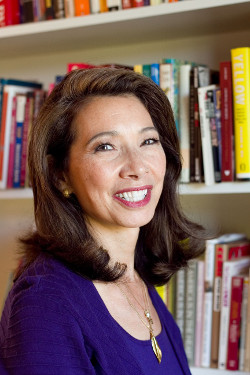At the University of Washington, curriculum transformation is a process that asks faculty members to take a critical stance on power and difference in the classroom, interweave multiple perspectives, and integrate student voices and knowledge into the learning process.
“The Diversity Blueprint and the Diversity Requirement set goals for change at the university level, but within each classroom, curriculum transformation is an opportunity for each instructor to create a thoughtful and equitable space for learning and to do so with support from instructional experts,” says Ed Taylor, vice provost and dean of Undergraduate Academic Affairs.
Academic units come to curriculum transformation with different needs and levels of understanding. Individual professors may vary in their comfort with discussing racial equity or connecting it to their classroom teaching topics. Consequently, units adopt different methods for undertaking this work.

Cynthia Del Rosario, diversity programs advisor, leads the iSchool’s Curriculum Transformation Project (CTP). Undoing institutional racism requires individuals to look inward and be vulnerable; Del Rosario knew that faculty would need trusted partners to turn to for support. As a result, she based the program around fostering mentorship relationships.
CTP builds partnerships between community members who have expertise in diversity practices and faculty who teach core classes. The iSchool uses its network and alumni to identify potential experts. Each quarter, Del Rosario recruits three to four people who can help integrate diversity into curricula and pedagogy. She then matches each with one or two faculty members based on subject matter expertise and compatible learning styles.
“We try to keep partners consistent [from year to year], so they understand our culture,” she says.
Over the quarter, expert partners support instructors in planning and implementing techniques to diversify their curriculum and make their classrooms more inclusive spaces. Step-by-step support includes:
- Orientation meeting: Del Rosario creates time for people to connect before the quarter and organizes activities to introduce concepts of microaggressions and privilege. This helps everyone develop a shared understanding and common ground – even if participants have been through the program before. Then each instructor meets with their partner to look at how syllabi, course content and activities can be adjusted to be more inclusive. Together, they create an action plan and discuss potential challenges and opportunities.
- Observations: Partners observe the teachers twice, near the beginning and end of the quarter. Partners can also participate in class if they and the instructor agree it’s appropriate. Throughout the quarter, experts are available to answer questions or discuss emerging situations. Because of the consistent nature of the partnership, “If something happens in a class, the partners already have context,” says Del Rosario.
- Debriefing: At the end of the quarter, the partners and instructors discuss lessons learned. They can base their reflection around guidelines Del Rosario developed to offer a sense of structure, but she emphasizes flexibility and freedom. “We say: ‘Do it how it’s going to work for you,’” Del Rosario says. “It’s not about reporting back or what it looks like on paper, it’s about how the partner can help the faculty best.”
An opt-in approach
The Curriculum Transformation Project formed with full support from iSchool leadership as an opt-in, grassroots-driven program that best fit their culture.
Del Rosario first invited instructors who previously expressed interest in diversifying their curriculum, then relied on their recommendations and testimonials to recruit additional faculty as the project continued. A self-selecting program, CTP regularly reaches out to faculty who teach iSchool core classes and encourages them to participate.
“The impact of the curriculum transformation project on iSchool students cannot be underestimated,” says Harry Bruce, dean of the iSchool. “We are educating and preparing information professionals who will serve and engage underrepresented and underserved communities and promote information equity throughout their careers.”
There are many ways for a unit to undertake curriculum transformation. As the iSchool demonstrates, open communication and mutual respect will always be key ingredients.
“There are a lot of ways to the top of the mountain,” says Del Rosario. “You pick up more people along the way when you build relationships. We want results but it’s more important that it’s right by people.”
The process of curriculum transformation may move slowly, but it offers the lasting impact of a more welcoming and inclusive environment — for everyone.
Excerpted from this feature produced by the Office of the Provost in partnership with the UW Race & Equity Initiative.